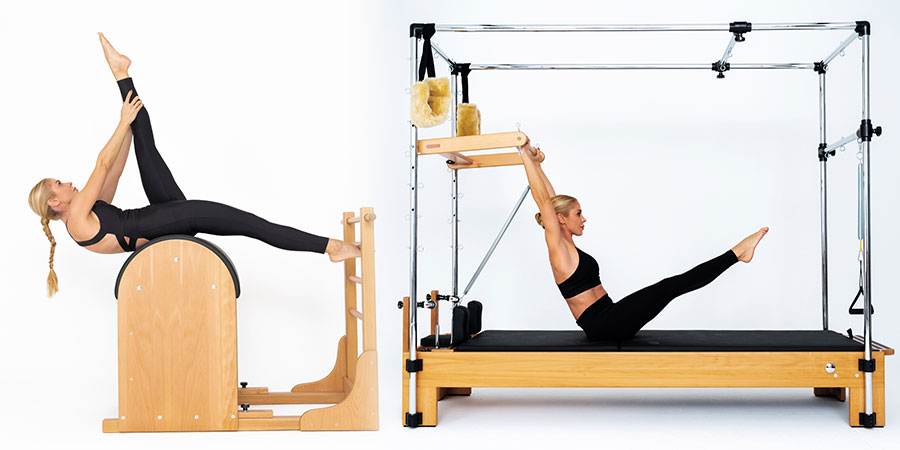Yes, it is possible to do Pilates if you have spinal stenosis, but it is important that you work with a qualified and experienced Pilates instructor who can tailor the exercises to your specific needs and ensure that you are performing the exercises correctly.
Pilates can be beneficial for people with spinal stenosis, as it can help strengthen the muscles that support the spine and improve spinal flexibility and mobility. Additionally, Pilates exercises can help improve posture and reduce pain and stiffness associated with spinal stenosis.
However, it’s important to check with your doctor before beginning any exercise program, including Pilates, especially if you have severe pain or problems with spinal stenosis. Your doctor can provide you with specific recommendations and exercise guidelines based on your individual condition and level of physical activity.
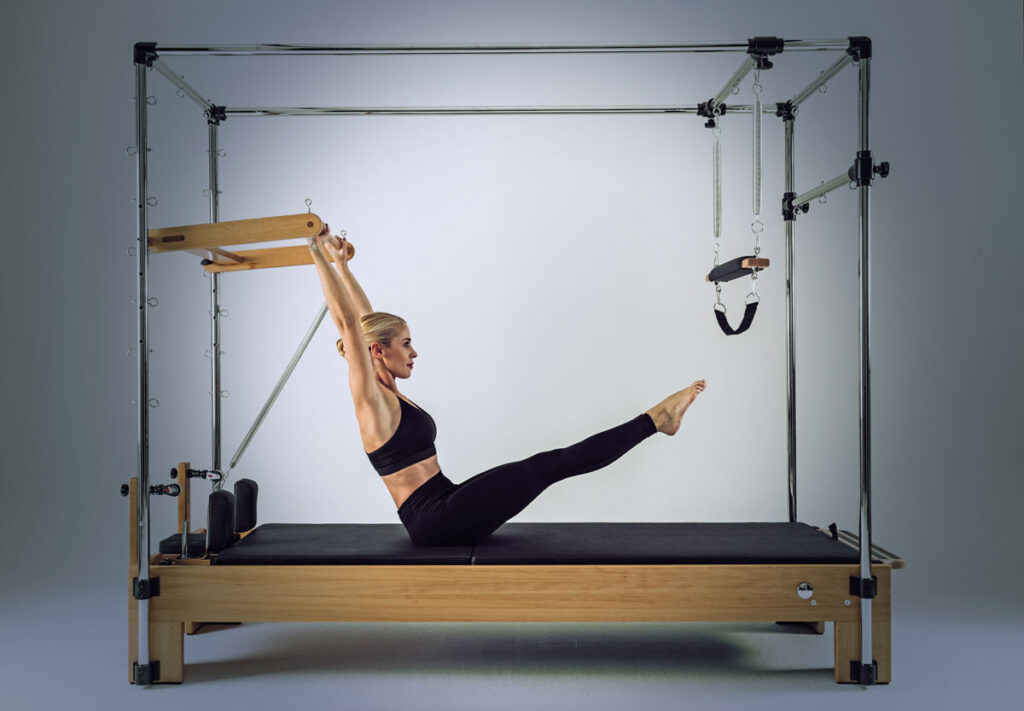
Spinal stenosis is a medical condition
In which the spinal canal is narrowed, which can cause pain, weakness, and numbness in the extremities. While Pilates may be beneficial for some people with spinal stenosis, it’s important to check with your doctor and Pilates instructor before beginning any exercise program.
In general, Pilates exercises that emphasize lengthening of the spine and stabilization of the trunk may be beneficial for people with spinal stenosis. This includes exercises like the spinal stretch, the bridge, the hundred, the leg circles, and the swan.
However, it is important to avoid any exercises that may increase pressure on the spine, such as excessive bending or twisting.
In general, Pilates can be an excellent form of exercise for people with spinal stenosis as long as it is done safely and under the supervision of a qualified and experienced practitioner.
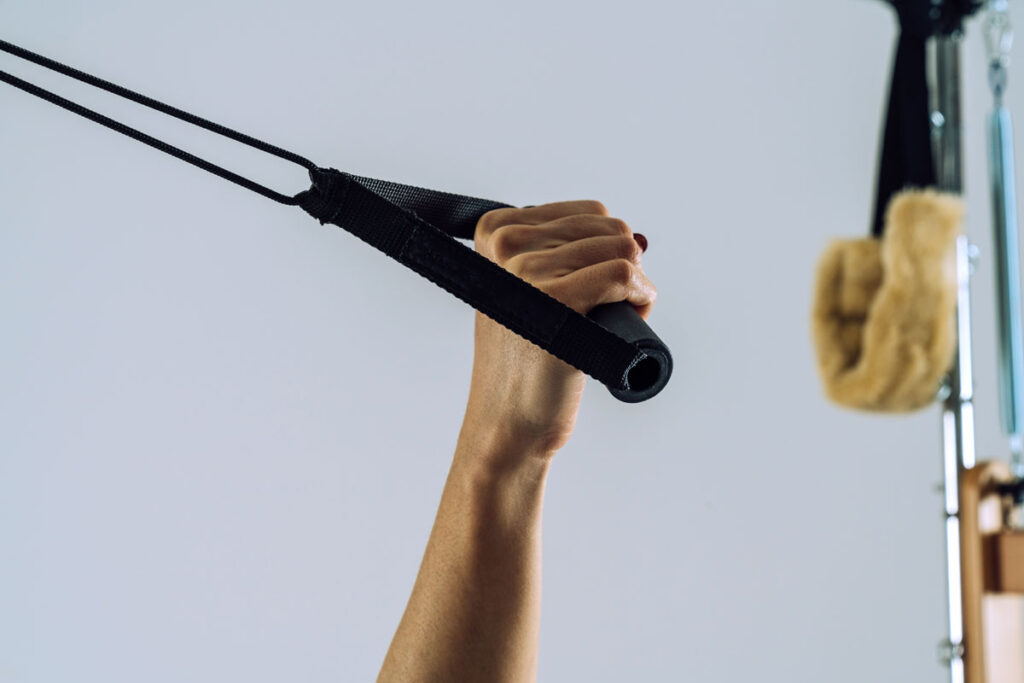
An interesting trivia about Pilates and stenosis is that some studies have found that Pilates exercises can help improve symptoms of spinal stenosis in some people. A study published in the Journal of Bodywork and Movement Therapies in 2018 found that a tailored Pilates exercise program can improve spinal stability and function in people with lumbar spinal stenosis.
Another study published in the Journal of Physical Therapy Science in 2019 found that a 12-week Pilates exercise program significantly improved muscle strength, physical function, and quality of life in people with lumbar spinal stenosis.
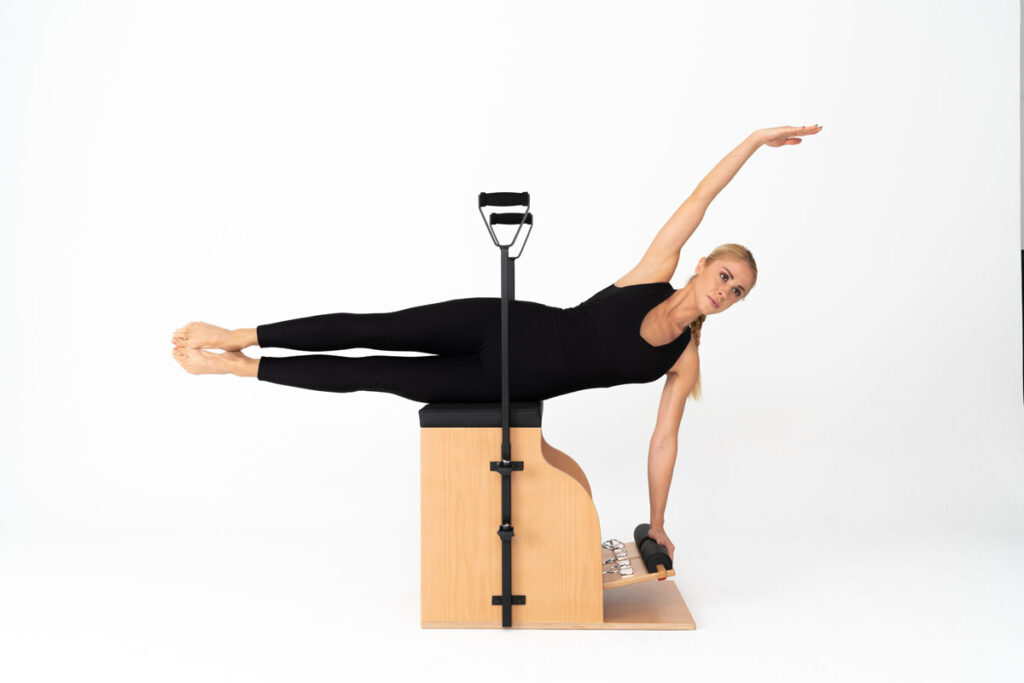
These findings suggest that Pilates may be an effective and safe form of exercise for people with spinal stenosis, as long as it is performed safely and under the supervision of a qualified and experienced practitioner. It is important to emphasize that each person is unique and that Pilates exercises must be adapted to the individual needs of the person to achieve the best results.
If you have spinal stenosis, it’s important to check with your doctor and Pilates instructor before beginning any exercise program.
With that being said, here are some Pilates exercises that may be beneficial for people with spinal stenosis:
Spinal Stretch
This exercise is performed by lying on your back with your knees bent. The idea is to lengthen the spine and stretch the lower back. To do this, draw your knees up to your chest and wrap your arms around your legs, keeping your head and shoulders flat on the floor. Then, extend your legs up and stretch your arms up toward the ceiling, keeping your back in contact with the floor. Hold the position for a few seconds and then return to the starting position.
The Bridge
This exercise helps strengthen the gluteal muscles and lower back. To do this, lie on your back with your knees bent and your feet flat on the floor. Then, lift your hips and pelvis off the ground, keeping your shoulders flat on the ground. Hold the position for a few seconds, then lower your hips back to the ground.
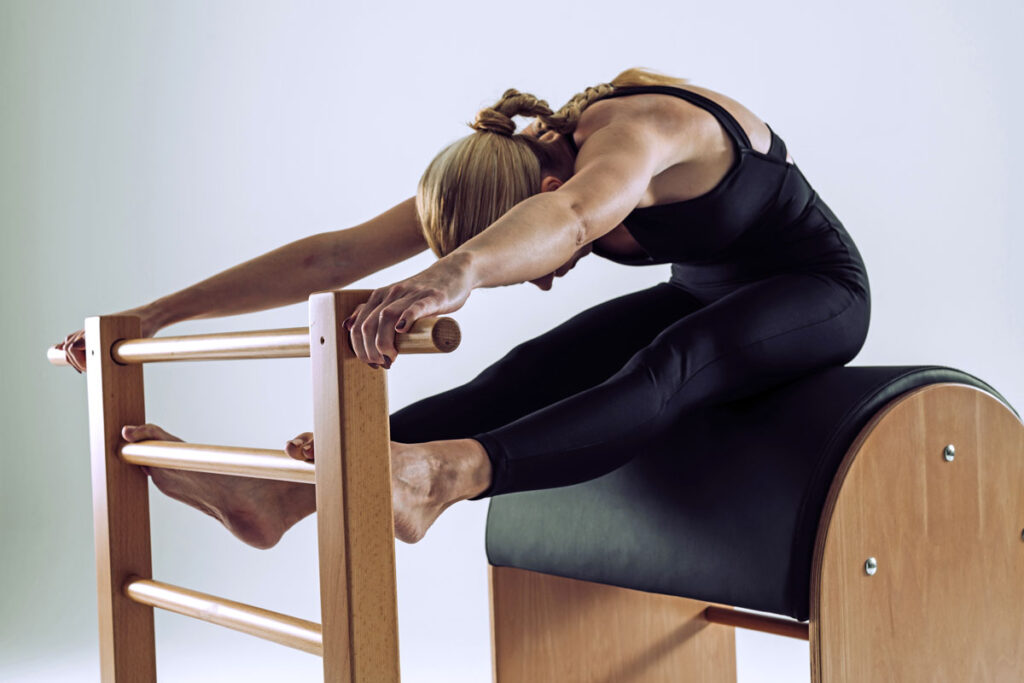
The series of hundred
This exercise helps to strengthen the abdominal muscles and improve breathing. To do this, lie on your back with your knees bent and your feet flat on the floor. Then lift your head and shoulders off the floor and stretch your arms toward your knees. Begin to pump your arms up and down while taking a deep breath. Hold for 100 pumps, then lower your head and shoulders back to the floor.
Leg Circle
This exercise helps improve flexibility in the hips and lower back. To do this, lie on your back with your knees bent and your feet flat on the floor. Then lift one leg up and make large circles in the air, keeping the other leg on the ground. Make several circles in one direction and then change direction. Then repeat with the other leg.
The Swan
This exercise helps strengthen the muscles of the upper back and improve posture. To do this, lie on your stomach with your arms stretched out in front of you. Then, lift your head, shoulders, and chest off the ground while keeping your arms stretched out in front of you. Hold the position for a few seconds, then lower back to the ground.
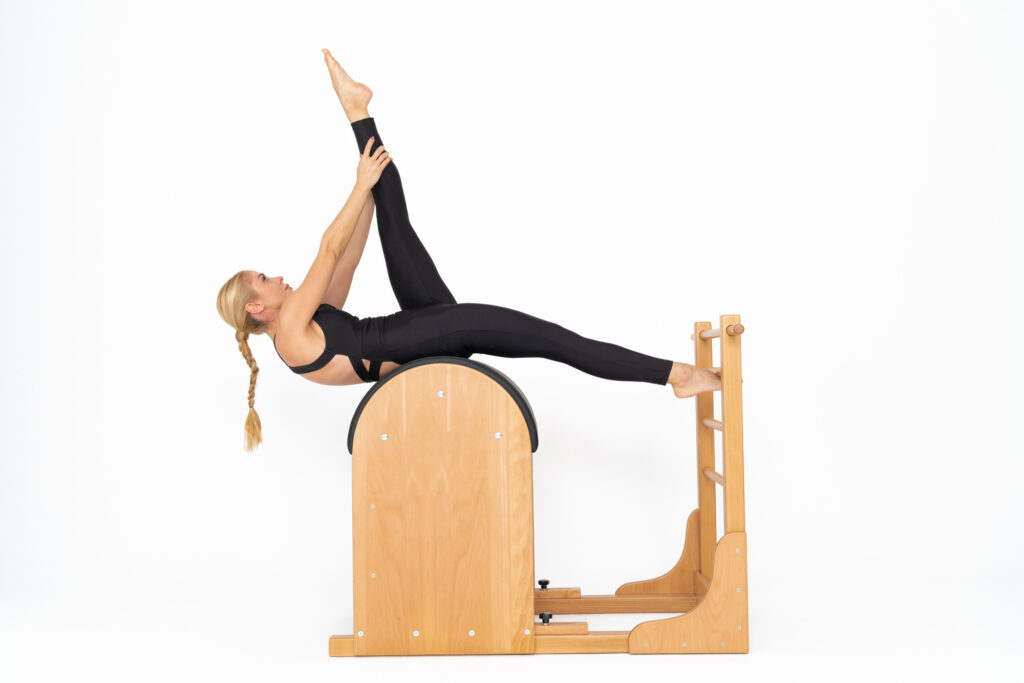
Other Pilates exercises that may be helpful include:
Cat-Cow
This exercise is performed in a four-legged position and consists of alternating between the arched spine position (cow) and the rounded spine position (cat). This exercise can help stretch your spine and back muscles.
Spine Stretch
This exercise is performed sitting on the floor with your legs extended and hip-width apart. It involves leaning forward from the hips and reaching for the feet with the hands. This exercise can help stretch your spine and back muscles.
Pelvic Curl
This exercise is performed lying on the floor with the knees bent and the feet flat on the floor. It is about raising the pelvis towards the ceiling and back down. This exercise can help strengthen the muscles of the back and buttocks.
Standing Arm Series
This series of exercises is performed while standing and focuses on strengthening the shoulder and back muscles. Exercises may include raising your arms out to the sides or in front and performing arm circles.

There are several Pilates machines that can be beneficial for people with spinal stenosis, as long as they are used safely and under the supervision of a qualified and experienced Pilates instructor. Here are some Pilates apparatus that may be helpful:
Pilates Reformer Vintage: The Reformer is one of the most popular pilates equipment in Pilates. It can be beneficial for people with spinal stenosis, as resistance and body position can be adjusted to work different muscles and areas of the spine. The Pilate Reformer can help strengthen your back muscles and improve posture.
The Pilates Reformer with Tower Vintage is a Pilates machine that combines the use of the Reformer with a pulley tower, allowing for a greater variety of exercises.
Pilates Cadillac Vintage: The Cadillac or Trapeze is another popular machine in Pilates. It can be beneficial for people with spinal stenosis as it can be used to work on different areas of the spine and improve flexibility. The Cadillac Reformer Vintage can help stretch and strengthen back muscles and improve posture.
Pilates Chair Vintage: The Wunda Chair, as designed by Joseph Pilates, is a small, portable machine used to work on different areas of the body, including the spine. It can be beneficial for people with spinal stenosis, as resistance and body position can be adjusted to work different muscles. The Pilates Chair can help strengthen back muscles and improve posture.
The Pilates Ladder Barrel Vintage is one of the Pilates machines that is used to perform specific Pilates exercises. It consists of a wooden structure that has a curved shape and is equipped with a series of steps or rungs at one end, and a pad at the other end. The goal of the Ladder Barrel is to allow users to stretch and strengthen their spine and improve posture.
The ladder barrel is one of the Pilates machines that can be effective for people with spinal stenosis. Exercises performed on the ladder barrel focus on extending the spine and strengthening the back muscles, which can help improve posture and reduce stiffness in the spine.

Here are some exercises I suggest you do on the Pilates Reformer Vintage:
Footwork
This exercise is performed by lying on your back on the Reformer with your feet resting on the footbar. It’s all about moving the footbar back and forth while keeping your pelvis stable. This exercise can help strengthen leg muscles and improve posture.
Knee stretch
This exercise is performed on all fours on the Reformer with the hands resting on the platform and the feet on the footbar. It involves bending the knees and bringing the footbar in toward the body while keeping the pelvis stable. This exercise can help strengthen your abdominal muscles and improve posture.
Long stretch
This exercise is performed in a plank position on the Reformer with the hands resting on the footbar and the feet on the platform. It involves pushing the platform back and then forward while keeping your pelvis stable. This exercise can help strengthen your back muscles and improve posture.
Backstroke
This exercise is performed by lying face down on the Reformer with your hands resting on the platform and your feet on the footbar. It involves raising your torso up and then slowly lowering it down while keeping your pelvis stable. This exercise can help strengthen your back muscles and improve posture.
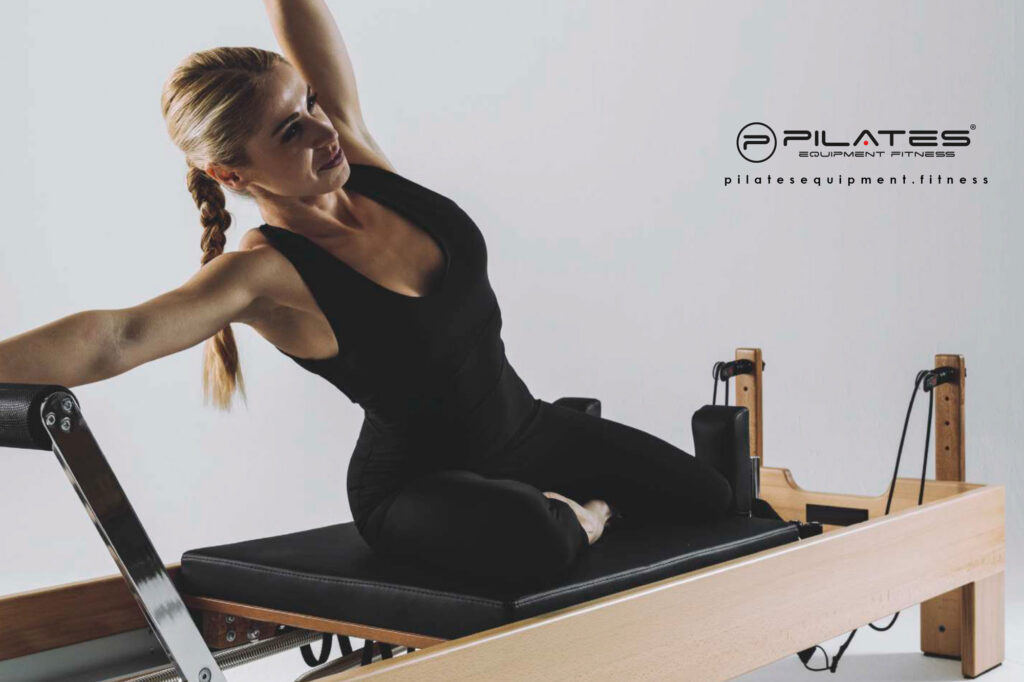
Some exercises that may be beneficial for people with spinal stenosis on the Pilates Reformer with Tower Vintage are:
Pulling Straps
This exercise helps strengthen the back and improve posture. Sit on the Reformer with your legs stretched out. Grasp the tower straps and pull them back, bringing your elbows in toward your sides. Then relax your shoulders and return to the starting position. Repeat 10 to 15 times.
Leg Circles
This exercise helps strengthen the hip muscles and improve mobility in the spine. Lie on the Reformer with your legs straight and the ankle straps attached to the pulleys on the tower. Circle one leg in and out, keeping your pelvis stable. Then switch legs. Make 6 to 8 circles in each direction.
Spine Stretch
This exercise helps improve mobility in the spine and relieve tension in the back. Sit on the Reformer with your legs straight and your hands holding onto the tower straps. Lean forward from the hips and tuck your chin in toward your chest. Then return to the starting position. Do 6 to 8 repetitions.

The Cadillac Vintage trapeze or Pilates is an excellent option to work the spine and improve posture in people with spinal stenosis. Here are some exercises you can do on the trapezius:
Arm circles
This exercise is performed seated on the trapeze with legs extended and hip-width apart. It is about moving the arms in circles forwards and backwards. This exercise can help improve shoulder mobility and improve posture.
Leg springs
This exercise is performed by lying on your back on the trapeze with your legs raised toward the ceiling and your hands holding the spring straps. It is about lowering the legs slowly while keeping the pelvis stable. This exercise can help strengthen your back muscles and improve posture.
Arm springs
This exercise is performed seated on the trapeze with your hands holding the straps of the springs. It’s about moving your arms up and down while keeping your spine aligned. This exercise can help strengthen arm muscles and improve posture.
Push through bar
This exercise is performed lying on your back on the trapeze with your hands holding the bar. It’s all about pushing the bar up and down while keeping your spine aligned. This exercise can help strengthen your abdominal muscles and improve posture.
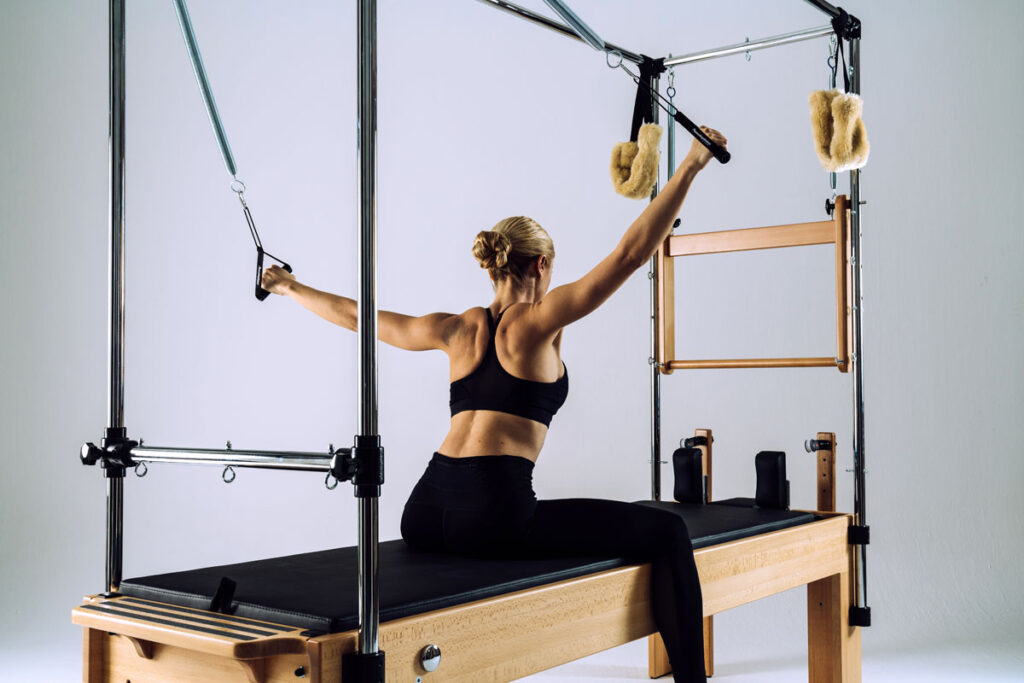
The Pilates Chair Vintage is a very effective and versatile Pilates machine that can be used to work the spine and improve posture in people with spinal stenosis. Here are some exercises I suggest you do on the Pilates Chair:
Arm circles
This exercise is performed sitting on the Chair with the legs extended and hip-width apart. It is about moving the arms in circles forwards and backwards. This exercise can help improve shoulder mobility and improve posture.
Pumping
This exercise is performed sitting on the Chair with the hands resting on the front handles. It involves raising and lowering the heels while keeps the spine aligned. This exercise can help strengthen leg muscles and improve posture.
Swan
This exercise is performed sitting on the Chair with the hands resting on the front handles. It involves leaning your torso forward and then back while keeping your spine aligned. This exercise can help strengthen your back muscles and improve posture.
Push-ups
This exercise is performed standing in front of the Chair with your hands resting on the front handles. It is about lowering and raising the body while keeping the spine aligned. This exercise can help strengthen your arm muscles and improve posture.
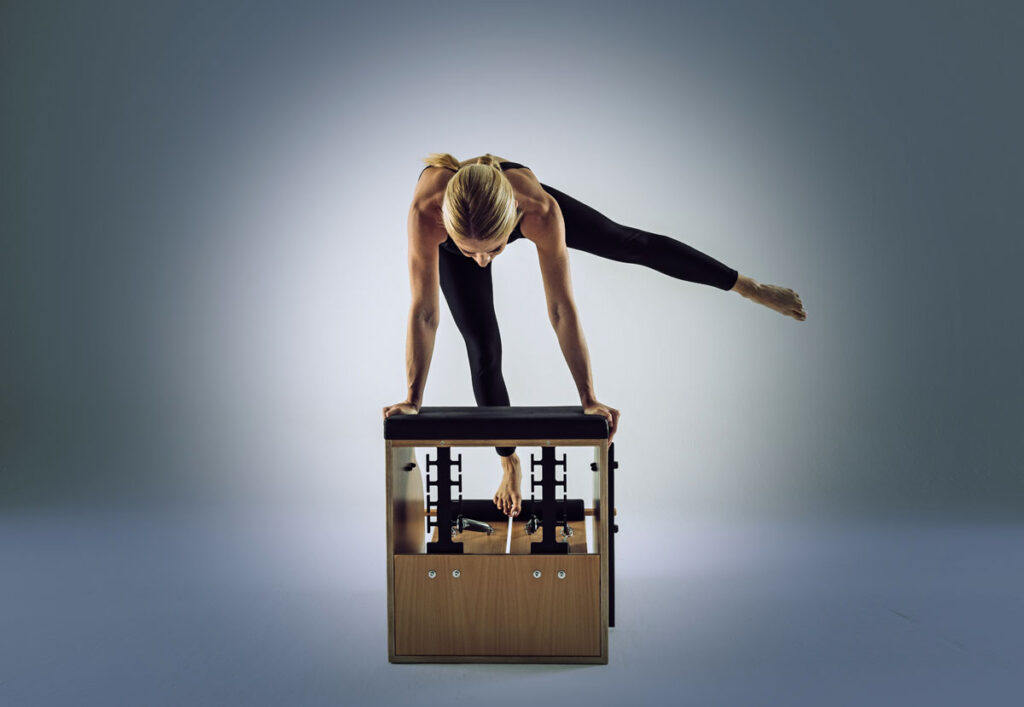
Here are some exercises I suggest you do on the Pilates Ladder Barrel Vintage:
Spine stretch
This exercise is performed sitting on top of the ladder barrel with legs extended and hip-width apart. It involves leaning forward from the hips and reaching for the feet with the hands. This exercise can help stretch your spine and back muscles.
Side bend
This exercise is performed sitting on top of the ladder barrel with one hand on the rung and the other hand on the head. It involves leaning to one side and then the other to stretch the lateral back muscles.
Swan
This exercise is performed by lying face down on the ladder barrel with your hands on top of the rung and your feet flat on the floor. It is about lifting the torso up while keeping the pelvis resting on the ladder barrel. This exercise can help strengthen your back muscles and improve posture.
Knee stretch
This exercise is performed lying on your back on the ladder barrel with your knees bent and your feet flat on the floor. It is about raising the legs towards the ceiling and then slowly lowering them. This exercise can help strengthen your abdominal muscles and improve posture.
It is important to remember that each person is unique, and Pilates exercises must be tailored to the person’s individual needs. Work with an experienced and qualified Pilates instructor who can tailor the exercises to your needs and make sure you’re performing the exercises correctly to avoid injury.
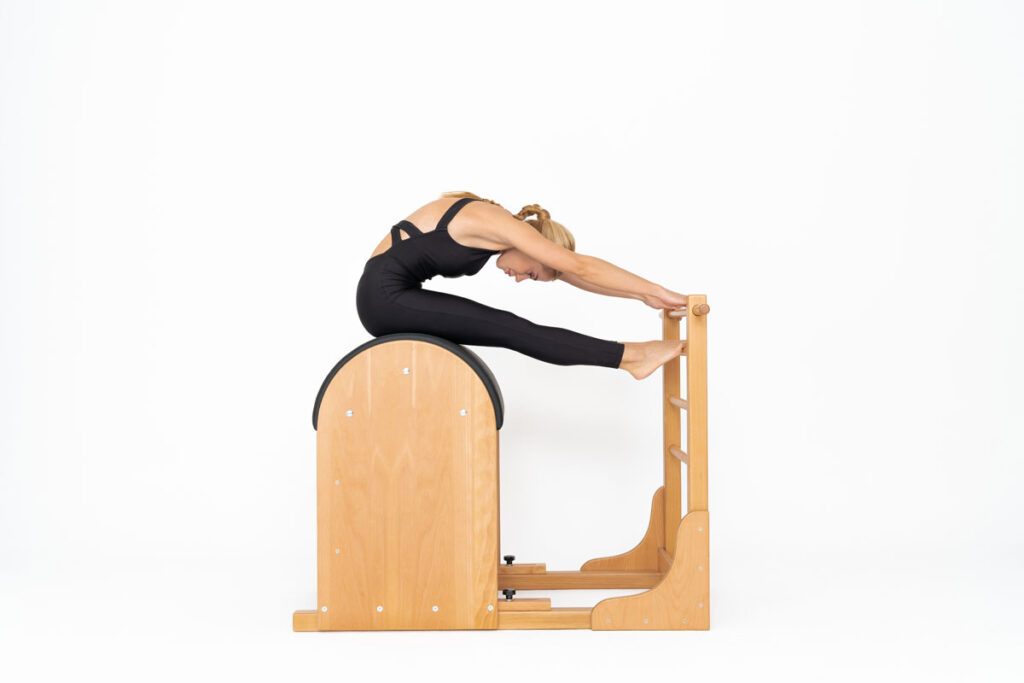
By Alison Parker

